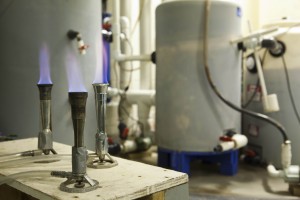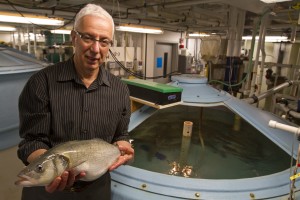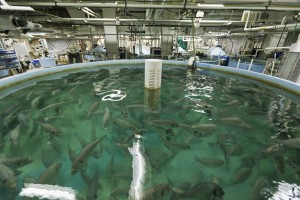The Aquaculture Research Center (ARC) is an extensive fish-holding facility located in the basement of the Columbus Center. ARC is an 1,800-square-meter, state-of-the-art, environmentally responsible marine core facility that provides excellent experimental capacity for research with marine organisms. It is a completely contained, recirculating operation with large-scale mechanical and biological filtration and life support systems that enable safe and efficient re-use of tank water. ARC contains multiple tanks of 1, 2, 3 and 4 meters in diameter (ranging in volume from 1 to 20 cubic meters) specifically designed to maintain broodstock and conduct research with fish of various species and sizes, 32 smaller tanks of 350 liters each for carrying out experiments with multiple groups of fish, as well as a complete hatchery area equipped with larval-rearing systems and facilities for culture of a wide range of food chain organisms for larval diets.

A computerized system maintains full control over the photoperiod, water temperature, salinity, oxygen and water chemistry in each of the ARC tanks, and water quality and operational parameters are constantly monitored. All environmental parameters can be modified to meet the requirements of specific culture conditions and experiments. The recirculating, artificial seawater is continuously treated with ozone, which maintains a disease-free environment. ARC also includes a 70-square-meter quarantine facility, a 50-square-meter pathogen room, and a 40-square-meter laboratory space designed for manipulating fish experimentally and performing basic bench work. This modern and generic facility is designed to conduct studies on multiple finfish and shellfish species. It is also a prototype for an urban mariculture operation which can be scaled up for commercial applications. A separate 50-square-meter algal production laboratory is tailored for the study and culture of marine micro-algae. This room, equipped with multiple banks of lights for growing vertical (hanging) 100-liter bags of algae, allows a daily production capacity of over 4000 liters of microalgae. DMB maintains an extensive repository of algae species in culture and ready for large-scale production. A dedicated ‘zebrafish‘ room contains nearly 300 tanks (1-38 liters) and provides optimal conditions for maintaining and experimenting with zebrafish.

The state-of-the-art 60-square-meter operation houses 192 X 38-liter , 30 X 3-liter and 70 X 1-liter aquariums in four recirculating water systems equipped with both bio-filters and bead filters. At full capacity, this facility could maintain up to 8,000 adult fish and 7500 embryos. This core facility is designed and approved for transgenic fish production and screening. We currently have significant broodstock (wild-type) zebrafish populations available, as well many different mutant and transgenic lines that are valuable for studying the neuroendocrine and muscular systems.
A brief video tour of ARC hosted by Dr. Zohar is posted on youTube.
For more information, contact Dr. Yonathan Zohar.
